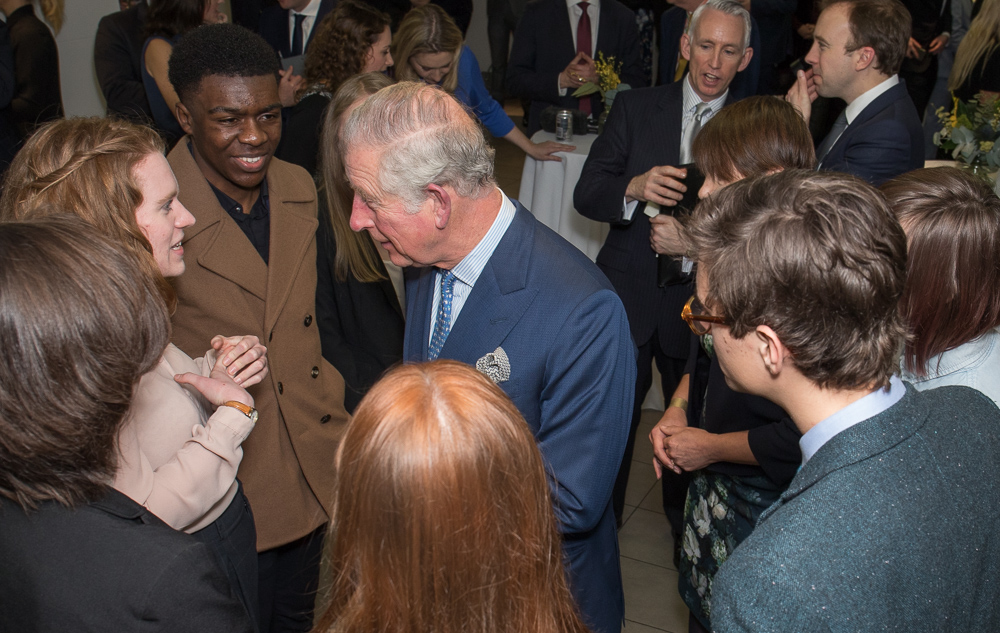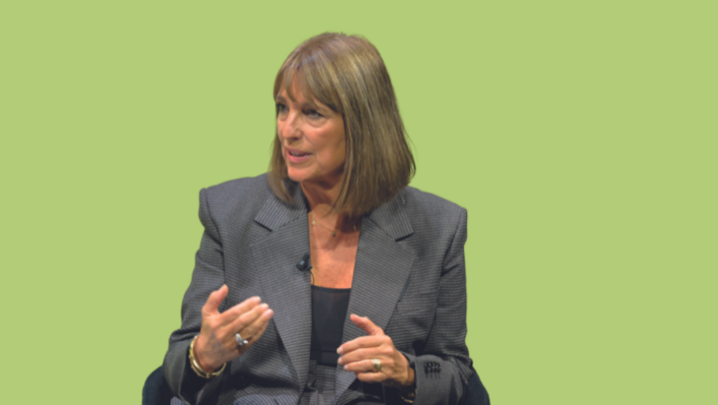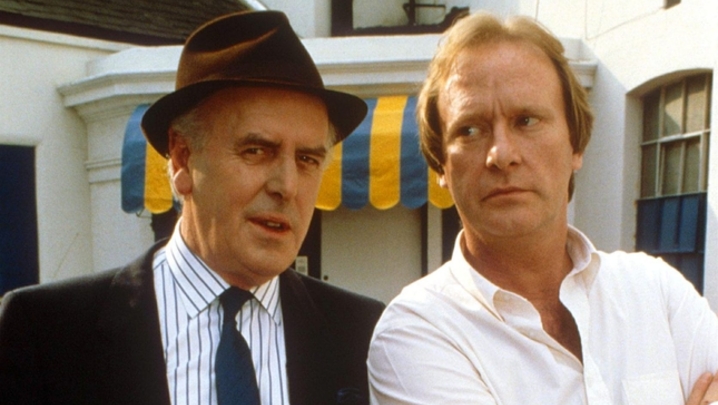In a Brexit-free zone, Peter Bazalgette looks back on the past 12 months.
JANUARY

(Credit: Paul Hampartsoumian)
ITV’s much-anticipated new Chief Executive, Carolyn McCall, finally arrives on the South Bank. The press chitter-chatter mentions her previous media experience at the Guardian. True, but few write about why we really wanted her: her brilliant curation of the customer relationship at EasyJet. All broadcasters now have to perfect their direct-to-consumer skills – from one-to-one online relationships to data-rich advertising.
Within days, we host television industry royalty in the tower. The RTS wants them to meet some Windsor royalty.
First the Society’s Patron, HRH Prince Charles, with the Duchess of Cornwall in support, tours This Morning for a taste of mutton stew and an encounter with apprentice guide dogs. Digby distinguishes himself by biting a fluffy sound boom and wrestling it to the ground. It’s bravely rescued by Prince Charles and the tabs have their story. Later, the party meets the impressive young talent coming through the RTS’s important bursary programmes.
Fantastic drama on Channel 4 this month: Kiri, with the incomparable Sarah Lancashire. Always good to see Coronation Street alumni prosper.
FEBRUARY
Speculation mounts that the Weinstein Company will file for bankruptcy, following a shocking catalogue of revelations. Extraordinary to think that Harvey was trying to flog his TV arm as recently as 2016. A problem for anyone taking his proposition seriously was his difficulty in presenting a set of discrete accounts for that division.
A bigger problem was the legendary charm of Harvey. When he realised this was an issue, I’m told that he said he really was a lovely guy to work with and, if you didn’t believe him, to call Barack Obama at the White House for a reference. We can just imagine the call: “White House switchboard... I’m sorry, the President does not take unsolicited calls… and Harvey who?”
MARCH
ITV, in common with other employers, publishes its gender pay gap. Of the bewildering array of statistics, our top-line 11.9% compares well with a national average of 18%. But it shows that we have work to do.
As I’ve pointed out in these pages before, the gender pay gap is consistently misunderstood. It reveals a lack of senior women in an organisation. It does not denote that men and women are paid differently for doing the same job – equal pay has been mandatory since the 1970s. Throughout the year, I hear senior journalists in all media completely confuse the two. Read my lips….
Boards have to set an example and, as we approach spring, ITV’s is heading for a 50/50 gender balance. I have to say that we’ve had no problem finding women of talent in finance, strategy and governance.
The Government announces a sector deal for the creative industries as part of its industrial strategy. It includes an investment in creative clusters, which I strongly recommended in my independent review in 2017. More of this later.
APRIL
Coinciding with Her Majesty’s 92nd birthday, we transmit The Queen’s Green Planet, in which two national treasures take a leisurely turn around Buck House’s garden. Yes, it’s Sir David Attenborough and Her Majesty in a brilliant confection, masterminded by Chris Shaw for ITN Productions.
My guess is that they only had 90 minutes’ access, but their picaresque progress around some noble oaks and ashes provides the spine for a worldwide arboreal dissertation. What do the royals do wherever they go? Plant a tree, that’s what. So, no shortage of relevant archive!
Gratifyingly, it gets 6.4 million viewers. And, at a Palace launch a few days earlier, the Woodland Trust gives us each a tiny hazel sapling. I plant mine in our Italian garden. How’s it doing? Well, I might get it its own webcam so you can track its progress to maturity. Slow TV is now the zeitgeist.
MAY
Who Wants To Be a Millionaire? successfully returns to the schedules. This confirms a trend I’ve noted: that the channels are currently reviving recognised entertainment brands with some success – Dancing on Ice, The Crystal Maze, The Gen Game (possibly). It contrasts with the period between 1995 and 2005, when non-fiction telly was revolutionised with new genres and formats. But a bit quiet since then.
The making, distribution and consumption of drama is where all the innovation is now. Soaring production quality, via CGI and drone cameras, box-set availability and the drug of seamless online binge viewing.… Netflix and Amazon pioneered this, but only because the competition authority bone-headedly prevented a British service nine years ago. A plague of kangaroos on whoever took that foolish decision.
JUNE
Yes, my friends, that cultural icon Love Island returns to ITV2. This has become the philosopher’s stone of broadcast TV: a massive young audience, lots of live viewers for the schedule, just as many catching up on ITV Hub and Hub+, 360° brand exploitation and sales around the world.

For those of you of a certain age who have resisted it thus far, feeling linguistically challenged, here’s a handy glossary: got a text = the producer is communicating with me; pied = dumped; peng sort = fit guy; mugged off = being deceived or disrespected; co-ord = apparel; 100% = I agree with you; crack on = indulge in romantic pursuits.
It reminds us that language remains wonderfully dynamic. Ah, Shakespeare, thou shouldst still be living at this hour…
JULY
The dating show that is the content industries these days rolls on: 21st Century Fox shareholders yield to Disney’s blandishments. And, in the wooing of Sky, Fox is also cleared for a takeover of Sky. But, is that the handsome Comcast hoving into view? We could do with Cilla to sort all this out.
This is the context for Carolyn to unveil her strategy to the markets. It’s entitled “More than TV”, a consumer-aimed offer referring to all the services beyond the schedule – AVoD, SVoD, live events and so on.
But also to the magic social glue of PSB (witness 10 million watching the Lost Voice Guy win BGT in June). “More than TV” also works for brand advertisers who can expect programmatic buying, targeting and ambitious creative solutions going forward.
Just about my favourite drama at the moment, Unforgotten, commences a successful third series. But the extraordinary ratings for England’s unlikely run in the World Cup, on both BBC and ITV, rather drowns out the rest of the schedule.
Would we have said, at the turn of the century, that the PSBs would still be getting audiences of more than 20 million a couple of decades later?
AUGUST
The holiday month kicks off with a powerful piece in the Guardian by Damian Collins MP, the Chair of the Digital, Culture, Media and Sport Committee. Damian is taking an admirable lead on the way that Silicon Valley, for all its benefits, is hollowing out civil society.
We could talk about abuse of privacy or IP, dodgy commercial impacts, failure to pay proper tax or extreme porn. But, on this occasion, Damian is concerned with fake news and democracy.
He proposes fining the likes of Facebook when they’re guilty of promoting campaigns of disinformation. It pulls the values of public-service news into sharp focus, arguably more important today than in the pre-internet era.
Preserving a funding model for trusted and reliable news must be a political priority, as well as guaranteeing its prominence.
SEPTEMBER
BBC One enjoys an extraordinary breakout hit with Bodyguard. Its finale consolidates with 17.1 million (the sort of TV audience which That’s Life! was winning back in 1978, when I worked as a researcher for the blessed Esther). I admit this smothers our rival in the schedule, Vanity Fair, which meets its Waterloo, so to speak.

But it gradually gets appreciated in the public prints that there’s a silver lining for ITV. Of course, Jed Mercurio’s creation is made by World Productions, part of the ITV Studios family.
It underlines for me how those old rivals, the BBC and ITV, must now become the best of friends in order to prosper in our brave new world.
In other news, the BBC’s highly original Killing Eve is the cult hit of the month. And Comcast gets Sky for a lorra, lorra money, as Cilla would have observed.
OCTOBER
The last day of the month brings the announcement of Channel 4’s relocations (and plaudits to Alex Mahon for defusing a row with the Government, where the politicians seemed to have a point).
The second HQ will be Leeds, an excellent choice, where ITV already has a substantial news and production centre, not to mention the Woolpack watering hole for Emmerdale’s thirsty residents. Bristol and Glasgow will also get a boosted Channel 4 presence.
This follows hard on the heels of news of nine creative clusters to receive investment via the Arts & Humanities Research Council.
Two of them, led by local universities, are in Leeds and Bristol/Bath. This makes the Channel 4 decision even more valuable.
The creative industries are now worth £100bn a year to our economy and are growing much faster than most other sectors. They’ll also create jobs while AI destroys entire occupations elsewhere. The point of the clusters is to drive forward innovation in the likes of immersive tech and 5G. And it does, indeed, require a coherent and determined industrial strategy.
NOVEMBER
Crossrail’s opening is postponed for a year… curses! It was going to be my new mode of transport from west London into work. This year, ITV has moved to new offices in Holborn after five decades on the South Bank. The tower became a bit of a sick building (when the lifts broke, we had to buy the spares on eBay) and the site will now be redeveloped.
This means my obvious route to ITV is the Central Line. But, in this hottest of hot summers, it became an even more sadistic sauna than ever.
I have to ask myself: your career started at BBC News as an act of aspiration; you were later lucky enough to have a bit of inspiration (well, a couple of hits, anyway); but must it all end with you drowning in perspiration?
DECEMBER
I’m writing in early December and I’m not into making predictions… so a brief reflection that last month saw the last edition of Big Brother on Channel 5. As a result, I’m invited on to (it seems) everything from Russia Today to Shetlands Radio. I decline, since I prefer to look forward not back (and I’ve got time off for good behaviour, having not seen the show since 2007).

Back in 2000, it was innovative in many ways. But most intriguing was how it enfranchised and educated the audience by streaming, and thus broadcasting, its rushes. Everyone had a view on how “fair” or “unfair” the nightly edits were. Thus demonstrating that the hallowed documentary-maker’s art was always entirely the subjective view of the director.
Can’t a channel (Channel 4 perhaps?) ask two directors to edit the same material and broadcast both shows? I bet you that the narratives would be entertainingly different.
There, I didn’t mention the B-word once… a happy new year to all our readers.
Sir Peter Bazalgette is Chair of ITV.






